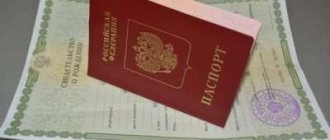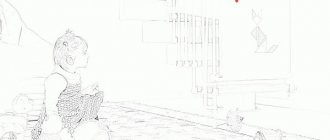Home / Guardianship / Characteristics of the child under guardianship from the class teacher
The modern child spends most of his daily life at school. And sometimes teachers and educators know more about students than busy parents. Especially a lot of attention goes to children left without parental care and under guardianship or guardianship.
Detailed and complete information about a student (character traits, talents, learning abilities and creativity, relationships with peers) can be found out from the teacher or teacher - in the form of characteristics .
In this article we will look at when a characterization of a child under care may be needed, and how to correctly prepare a characterization of schoolchildren of different ages.
Why do you need a reference for a child under your care?
A profile of a child in his care, compiled by a school teacher or educator, may be required in different circumstances:
| In a court | during court proceedings on the deprivation, restriction, restoration of parental rights, determining the child’s place of residence with his mother or father, determining the order of meetings of the child with the parent and other relatives (grandparents, brothers and sisters); |
| At the Juvenile Affairs Inspectorate | if a student commits an offense or crime; |
| In the guardianship and trusteeship authorities | in the course of holding a guardian or trustee accountable for violating the rights of a ward or failure to fulfill duties, when guardianship or trusteeship is canceled, or when the guardian or trustee refuses to perform duties; |
| In social service | during the work of a psychologist or social worker with a child in his care who has experienced trauma, stress, loss, cruelty, and has difficulties in relationships with peers and elders. |
This list of authorities and services where characterization of a child may be required is far from complete.
In addition, characterization may be needed not only for sad and tragic reasons (for example, a crime committed or family discord), but also for solemn and festive occasions (for example, rewarding gifted children, an invitation to a concert, the Kremlin Christmas tree) or regarding the provision of material support from the state or local authorities .
How to write a characteristic for a guardian
Marchenko Alexander Ivanovich, born on February 30, 1967. He has a higher education in the specialty “design engineer of aircraft engines and power plants,” as evidenced by the presence of state diploma No. 52/28 dated June 27, 1982, issued by the Moscow State Technical University. He has held the position of senior designer at Motorstroy OJSC since December 6, 1985. In 1995, Alexander Ivanovich successfully completed advanced training courses, after which he was given the position of chief designer of the enterprise. Responsibilities include managing the design of advanced aircraft technology. He performs his work conscientiously and is constantly improving his knowledge. There is a desire to design and recreate new technologies. In relation to the team he is polite, principled, fair and sociable. More than once he took first place in annual chess competitions among employees of Motorstroy OJSC. In his younger years, he was the captain of the company's handball team. He has no bad habits and is actively involved in sports. He is an exemplary family man and is raising his son. Hobbies: football, handball, chess, cars.
- In order to determine the social status of the future guardian or trustee;
- Establishing the conditions in which a person lives in order to decide whether he can provide for another person;
- To diagnose the condition of the future guardian, in order to check his sanity, adequacy and mental balance;
- To determine financial capabilities. This factor is considered one of the most important, since guardianship of another person involves large costs;
- Establishing a person’s state of readiness for guardianship, both from a physical and moral point of view.
You might be interested ==> Vehicle Inspection Report to Assess Market Value
How to write a reference for a child to the guardianship authorities?
Writing a description of a child is not an easy task. This document must be clear and structured in form, while being quite “informal,” complete, detailed, and comprehensive in content.
Form
The specification must be in writing - typed or handwritten.
Basic information about the ward child that must be indicated:
- Title: “Characteristics...”;
- Full name, date of birth, school number and class the child attends,
- place of residence;
- character traits;
- degree of academic performance in core and elective subjects;
- extracurricular interests and additional activities (clubs, sections);
- behavior;
- relationships with peers;
- features of family relationships (cohabitation or separation with mother or father, presence of brothers or sisters, appointment of guardianship or trusteeship);
- the presence or absence of basic things (seasonal clothing and shoes, school supplies), the degree of satisfaction of basic needs (safety, food, warmth, sleep, cleanliness);
- date of;
- signatures.
The description must be signed by the author (teacher or educator) and the school director. The number of the outgoing document must be indicated in the upper corner of the document.
The characteristics are drawn up in 2 copies: the first is sent upon request (for guardianship, court, internal affairs, social services), the second is kept in the student’s personal file.
Content
The characterization should not be “dry” and impartial. It must fully reflect all – positive and negative – features of the child’s personality (character, talents and interests, abilities and motivation to learn, habits, manner of speech and behavior), as well as the characteristics of the child’s relationships ...
- within the family (with parents, guardian or trustee, relatives),
- with peers,
- with officials (teachers, psychologist, director, representatives of the Guardianship Authority, police, court).
When characterizing a child’s personality, use the following criteria:
- motivation for learning, getting an education - strong or weak;
- core and elective subjects with high academic performance;
- core and elective subjects with low performance;
- items of interest
- subjects in which there is a complete lack of interest;
- extracurricular interests;
- stubbornness or flexibility;
- perseverance or restlessness;
- influence or suspiciousness;
- friendliness or isolation;
- restraint or spontaneity;
- organizational skills – strong or weak;
- leadership or followership;
- responsiveness or indifference;
- shyness or boldness;
- respect or insolence;
- independence or need for support, constant control, guidance;
- trusting or hostile relationships in the family;
- aggressiveness or calmness;
- “difficult” or pliable, affectionate disposition;
- high or low self-esteem;
- ambition or modesty;
- satisfied or painful need for acceptance, support, attention from adults and peers;
- close or tense relationships with mother and father, guardian or trustee, relatives.
Additionally, you need to indicate how much the basic (housing, physical) needs of the child are satisfied - safety for life and health, availability of a sleeping place, warmth and cleanliness, availability of food and ready-made food, seasonal clothing and shoes, school supplies.
When compiling a characterization of a child under guardianship, remember that a lot can depend on the completeness and reliability of the comprehensive presentation of information contained in it (for example, registering a child with regulatory, medical, social authorities, removing a child from a dysfunctional and dangerous family, making a decision about a place residence, deprivation of parental rights, appointment of guardianship, removal and holding a guardian or trustee accountable).
Mechanism for assessing the development of personality traits
In each educational institution, several specialists carry out joint work on the development and education of the ward:
- a class teacher who communicates closely with the child and is constantly in touch with the guardian or trustee;
- a psychologist who diagnoses the internal state of a minor’s personality;
- a social teacher who interacts with the guardianship department and collects information about the child at the request of the department.
This is also important to know:
How to write a characteristic for a 1st grade student?
It is the psychologist who is responsible for developing the personality qualities of the ward. In the characteristics of the child for the guardianship authorities, he can give a description of his level of development, which is measured by the following indicators:
- performance (with high performance, the student can actively participate in classes in all lessons, with average fatigue is observed, in case of poor performance, he suffers from irritability, drowsiness, lethargy);
- the ability to highlight the main thing in the studied material;
- to what extent he thinks independently;
- ability to work in classes at the required pace;
- manifestation of self-control in the educational process;
- How consciously the child approaches learning activities.
Using these criteria, the psychologist assesses the level of development of the minor, which can be useful in determining the educational route together with the guardianship authority if the child, for objective reasons, does not keep up with the programs.
Sample characteristics for a supervised student:
Age differences affect character traits, interests and motivation for learning, and children’s relationships with peers and elders.
In addition, in addition to lessons in basic subjects, children’s time is organized in different ways: children of primary school attend extended day groups, middle school children attend hobby groups and clubs, and senior children attend additional classes in preparation for graduation and admission.
Therefore, the characteristics for children of elementary, middle, and high school are also different.
from elementary school
from high school
from high school
Expert opinion
Dmitry Nosikov
Lawyer. Specialization: family and housing law.
If you need the help of a lawyer in family matters related to the establishment of guardianship and trusteeship, deprivation of a mother or father of parental rights, care and placement of children from disadvantaged families, contact our lawyer for a free consultation.
Attention!
- Due to frequent changes in legislation, information sometimes becomes outdated faster than we can update it on the website.
- All cases are very individual and depend on many factors. Basic information does not guarantee a solution to your specific problems.
That's why FREE expert consultants work for you around the clock!
- via the form (below), or via online chat
- Call the hotline:
- Moscow and the Region
- St. Petersburg and region
- FREE for a lawyer!
By submitting data you agree to the Consent to PD Processing, PD Processing Policy and User Agreement.
Anonymously
Information about you will not be disclosed
Fast
Fill out the form and a lawyer will contact you within 5 minutes
Tell your friends
Rate ( 2 ratings, average: 5.00 out of 5)
Author of the article
Irina Garmash
Family law consultant.
Author's rating
Articles written
612
Sample
Characteristics of the student (class/school)
(child’s first name, patronymic),
residing at:
at the request of the guardianship and trusteeship department
year, day, month.
(Child's name) came to first grade in September 2012. Social adaptation in the class was difficult, communication with children was not easy, the boy was quite complex and avoided active participation in any event (it doesn’t matter whether it was a social assignment or a game).
At the beginning of training, a high level of cognitive processes was revealed. Humanitarian subjects (literature, social studies, etc.) are of particular interest. Loves to draw, look at pictures, listen to fairy tales, stories, music.
The vocabulary is small (perhaps due to infrequent communication with peers). There is inattention and absent-mindedness in behavior, especially if the child does not like the topic of the lesson.
The general level of memorization is average, there are the makings of logical perception, and the figurative type of thinking is well developed.
The boy is friendly by nature and willingly responds to requests. (child's name) has not yet taken a particularly active part in the life of the class. According to the results of sociometry, the child is not a leader, but also does not have a tendency to obey. Listens to the opinions of teachers and parents. The prevailing mood is good.
The school psychologist conducted a diagnosis of intra-family relationships, which gave the following results: the child’s subjective assessment of his family is positive, the child feels more trust in his mother, the relationship with his father is complex. The reason is that the boy’s father is not his own. The presence of negative feelings towards this person is clearly visible in the boy’s conversations and drawings - the child deliberately excluded him from his own inner world. He has not yet determined his place in the family; he is passive and quiet in all relationships with all family members.
This is also important to know:
How to write a reference for a doctor: samples
During testing (child's name) was in satisfactory psychological and physical condition, without additional tension and overwork.
Date of compilation Class teacher: Full name __________
Teacher-psychologist: Full name ____________
Primary school
Characteristics for supervised elementary school students are written taking into account the age characteristics of the children. During this period, they develop writing, counting, reading, and other basic skills that they will use in the future. In this regard, it reflects:
- how efficient the student is;
- does he willingly carry out the teacher’s tasks;
- are there any deviations in behavior that need correction;
- whether the child easily perceives information, how he copes with homework;
- the level of independence is described;
- whether he is registered with the KDNiZP, the department of precinct commissioners;
- the child’s relationships in the team, whether he has friends;
- what is the condition of his clothes, shoes, stationery;
- how the guardian performs his duties, what are the relationships in the family.
In the description of an elementary school student or student, after describing the situation, the signature of the author and the director with the seal of the school is required.
Middle and high school
For guardianship, information from school is practically the main document indicating the level of education of the ward at any age - elementary, middle and high school. In the last two cases, children may lose motivation for learning; it becomes a secondary priority for them, and the first priority is mastering certain roles in a team and relationships with peers. Taking these features into account, the document should reflect:
- how developed the acquired skills and knowledge are by this age;
- whether there are absences from classes and unsatisfactory grades, whether the child strives to correct them;
- relationships with teachers;
- position in the team;
- does he attend additional electives or participate in school events of his own free will;
- Does he have hobbies, what sections and clubs does he attend;
- relations with the legal representative and the social environment.
IMPORTANT! If a ward has any problems, an alarm signal should immediately be sent to the control agency, since its specialists are authorized to assist the family in solving problems.
Successful student
A child in care who succeeds in learning should be rewarded for his work, responsibility and discipline. Guardianship specialists identify such children and, if possible, assist in the implementation of their future plans. It is in the interests of the state that a child with a difficult fate has hope for a decent future. In such circumstances, the document should indicate:
Free legal consultation
We will answer your question in 5 minutes!
Free legal consultation We will answer your question in 5 minutes!
Call: 8 800 511-39-66
Ask a Question
- what potential does the minor have;
- list merits - participation in events for the honor of the school, district, city, region or region;
- inform about relationships with classmates;
- are there any peculiarities of personal development;
- subject grades;
- how additional employment is organized;
- level of relationship with caregiver and family members.
This is also important to know:
How to write a characteristic for an 8th grade student, samples
If a child has special merits at school, his legal representative can also count on gratitude from the supervisory authority for his conscientious upbringing.
Lagging behind in learning
The situation with lagging students is more complicated than with successful ones, since it signals the presence of problems in the family, society, and school. The teacher should analyze in detail all the circumstances leading to such consequences and reflect in the document:
- what played a negative role in the child’s life (the death of his parents, their bad attitude towards him, how well he felt with his guardian, where he was previously raised);
- whether there is pedagogical neglect or developmental delay;
- what is his academic performance indicating grades;
- relationships with peers;
- determining the reasons for academic failure (lack of motivation, failure to assimilate the material, difficulties in perception, understanding, thinking);
- level of family well-being;
- recommendations for implementation (whether it is necessary to work on a further educational route, contact a psychiatrist, neurologist, or other specialists).
In this situation, the main goal is to help the child in his difficult situation, to protect the rights and interests.
For a difficult student
With difficult children, organizing the educational process is difficult due to their individual characteristics - psychological trauma, unfavorable living conditions, bad habits instilled by parents before the establishment of guardianship. They usually manifest themselves in behavior: the teenager begins to smoke, drink alcohol, leave home, and does not control emotions. Taking into account these criteria, the characteristics for a child in guardianship indicate:
- is there a decrease in motivation for education;
- assessments and non-certifications, absences from classes;
- positions and life beliefs;
- does he complete his homework, if not, then for what reason;
- what work was done by school specialists with the child to resolve the condition;
- How critical is the situation, is additional assistance from departments required;
- family problems, whether the ward is comfortable in this family, the environment and microclimate.
If such circumstances exist, the care institution gets involved in working with the teenager and tries, together with teachers, to improve the situation.
This is also important to know:
What is a psychological personality characteristic?
For graduate
A description of the situation with the educational process for a graduate is necessary not only for the board of guardians, but also for his admission to professional institutions. In this case, the class teacher describes:
- how the student has proven himself over the entire period of study;
- the dynamics of his academic performance from elementary school to high school;
- personal qualities formed during study;
- was there additional employment (music school, sections);
- relationships with peers in the class, what position he occupies among classmates;
- goals and objectives that the student sets for himself in the future;
- inclinations identified as a result of professional guidance;
- relationship with the trustee.
When entering a university or secondary educational institution, the department for protecting the rights of children who are left without parents can draw up a letter of recommendation, which will describe the best aspects of the candidate for a profession.
Mandatory subparagraphs
It is necessary to know the rules for writing characteristics, because... If they are violated, the document drawn up may have no legal force. The document consists of 3 parts.
In the upper right corner (or in the center of the sheet) indicate the personal data of the child for whom the characteristics are being compiled:
- Child's full name;
- place of study, class;
- date of birth, place of residence.
The next part of the document contains the following information:
- date the child entered school;
- the general level of knowledge at the beginning of studies and the acquired skills at the time of writing the characteristics, which subjects are more successfully mastered, what are the difficulties;
- features of thought processes, memory, attentiveness;
- level of health and physical activity;
- psychological adaptation in a team, relationships with peers, teachers;
- student motivation to study.
General reasonable conclusions and forecasts of the author's characteristics. Date/signature.
Dear readers! To solve your problem right now, get a free consultation
— contact the on-duty lawyer in the online chat on the right or call:
+7
— Moscow and region.
+7
— St. Petersburg and region.
8
- Other regions of the Russian Federation
You will not need to waste your time and nerves
- an experienced lawyer will take care of solving all your problems!
Pedagogical characteristics for an orphanage pupil
The girl knows how to stand up for herself, you can always rely on her, she does not refuse assigned tasks, she is able to bear responsibility before society. Knows and respects the Constitution and laws of the country, honors traditions. A psychological examination revealed a low level of verbal-logical and visual-figurative thinking.
1. Physical development. 2. Mental development. As a rule, the consequence of deprivation of the child’s development process in an orphanage is mental retardation. Copy this code and paste it onto your website. After you share the material, a download link will appear below.
During the psychological examination of K.M., the following features were noted: He makes contact with difficulty; isolation and passivity are observed. Shows no interest in communication, contact is superficial. Cognitive interest in the tasks presented is unstable, the scope of sustainable performance is narrowed. The reaction to comments is present, but expressed in a weak form. Study skills are developed to a very low degree. Reading technique is also very poor. Questions regarding awareness of the world around him often give incorrect answers (the amount of knowledge about the world around him does not correspond to the age norm; this knowledge is fragmentary and unsystematic).
The girl recognizes domestic and wild animals in the picture, imitates the voices of animals, correctly assembles a pyramid, and distinguishes between primary colors. Experiences difficulties in comparing and grouping objects according to common characteristics, is often distracted when listening to works of art, and does not remember the texts of poems and nursery rhymes well.
The child mastered the program for the junior group of kindergarten at a level below the age norm. Self-care skills are not sufficiently developed: he cannot dress himself, eats selectively, and often refuses food. During classes, he accepts the learning task selectively, has difficulty understanding simple monosyllabic instructions, and when working with handouts, the child is often distracted and begins to play (construct from it). He can count, but cannot remember numbers. Has no idea about the relationship between numbers and quantity. In speech development classes, the answers are unclear. It is difficult to perceive assigned tasks, does not remember the sequence of actions well, and copies the behavior of hyperactive children.
We recommend reading: Payments to Single Mothers in Chuvashia
Login via uID. Drawing up a profile for a child is the responsibility of preschool employees. The information provided in the characteristics must be comprehensive and objective. We have developed an approximate diagram of characteristics of a kindergarten student that will help educators in their work. Pedagogical characteristics of a preschooler with autism spectrum disorders.
Characteristics of an orphanage pupil from a teacher
The child can understand the main idea of a fairy tale, a picture, combine several pictures based on a common feature, sort pictures into groups based on an essential feature, but is not well oriented in space and time. Characteristics of a child, sample
The document drawn up by the teacher, describing the level and degree of personal development, must indicate the child’s performance, reaction to comments and demands, ability to manage his behavior, character traits (modest, quiet, impulsive, etc.). The description of the personality of a preschooler should also reflect the state of psychophysical processes: attention (stable or not), ability to concentrate, switchability, perception of phenomena (appropriate or not for age), the child’s time representations, development of memory and verbal-logical thinking. The characteristics of the child in the preschool educational institution from the teacher must be dated. The teacher's signature is placed on the last page. The document is endorsed by the head of the preschool educational institution.
The mother, due to her individual personal abilities and state of health, is able to satisfy only the minimum necessary needs to maintain the life activity and upbringing of the minor. An emotionally significant and attractive person for the child is her aunt (mother’s sister), with whom the minor maintains a positive relationship, however, due to their separate residence and only periodic contact, they do not fully satisfy the needs that were not satisfied in turn by the parents. Educational psychologist _____________ UO
The social shelter is allocated special premises in accordance with the established procedure, which must be sufficient in area, aesthetic, have all types of communal amenities (central heating, water supply, sewerage, electric lighting, radio, telephone), meet sanitary and hygienic standards, fire safety requirements and be equipped with the necessary rigid and soft goods, other material supplies and equipment. Preschool educational institutions employees who make up the profile must adhere to the standards of the educational program adopted in their institution. Such a requirement will help assess the degree to which the preschooler has mastered the material and see a list of goals he has achieved.
Loves to be in kindergarten. A sample of writing a psychological and pedagogical profile for a child. Psycho-pedagogical characteristics. When entering a kindergarten, any educational institution, or to provide information about a specific person to government agencies, a character reference for a kindergarten child may be required. The drafting template may change. Psychological characteristics of the child f. attending kindergarten from 2011 Alicia is brought and picked up from kindergarten mainly by her mother, sometimes together with her father.
To pass the PMPK or ITU commission, a pedagogical characteristic for a child is required. It can be written on specific points or in any form. I offer a sample of my characteristics of a child aged 3.5 years, which was attached to the documents for passing the MSE to determine the status of a disabled child. The description was written in free form and was completely appropriate. It must also be certified by the seal of the kindergarten and necessarily the signatures of the teacher and the head.
We recommend reading: What do they give for 4 children in the Moscow region 2021
During my studies in kindergarten, my active vocabulary increased. Free expressions are dominated by simple, common, complex sentences. There is insufficient development of the grammatical forms of the language (errors in coordination and control)
. Retells coherently, consistently, does not violate semantic parts. Sound pronunciation is at the stage of production and automation of sounds. There are positive dynamics in the learning process.
The child does not immediately show trust in others; negative reactions to requests from adults, stubbornness, and whims are observed. Contacts with peers are short-lived, creates conflict situations during games (takes away and throws toys, pushes children). The games are monotonous, he quickly loses interest in the game, moves from one toy to another.
Educator: Ivanova M.I. Characteristics of a pupil of the state educational institution for children - orphans and children left without parental care "Krasnokamensk orphanage" Full name and date of birth of the child Mother: Father: The girl arrived at the Krasnokamensk orphanage on 01/01/2008 from the orphanage in the city of Krasnokamensk "Solnyshko" previously lived in village of Soktuy-Milozan. Currently, the girl is studying in 9th grade at secondary school No. 10.
Constant monitoring of appearance, cleanliness of clothes, hands, and hairstyle is required. Relationships with classmates are complicated, he often gets angry, freaks out, can tear a book, scatter it, chew a pencil, cannot critically evaluate his actions, there is no adequate understanding of what is good and what is bad. He cannot and does not want to play in a team, creating conflict situations.
Approximate writing of characteristics for a student at PMPK material on the topic
He is calm in class and participates during class. Can answer the question posed. Understands learning objectives. The ability to exert volition is reduced, and often does not complete the work started. Sasha does not have sufficiently developed skills and abilities to master the educational material. Mastering the program material:
The adaptation period was slow and difficult. A teenager does not have enough knowledge about the world around him. Knows information about himself, his mother’s name and patronymic. Experiences difficulties in establishing simple cause-and-effect relationships between phenomena of reality. General motivation is social. Educational and cognitive motivation is poorly developed. Attention is unstable, often distracted, attention span is insignificant. He understands educational instructions, but cannot work on them independently. Cannot independently find and correct errors in his work. It is difficult for Sasha to express his elementary judgment, to draw a simple logical conclusion. Fine motor skills of the hands are well developed, and does not experience difficulties in orienting in notebooks for counting and writing. Follows daily routine.
The mother is not an emotionally significant person for the minor, although her attitude towards her is positive. The mother, due to her individual personal abilities and state of health, is able to satisfy only the minimum necessary needs to maintain the life activity and upbringing of the minor.
Communication sphere: friendly, open, easily establishes contact, but is not inclined to communicate in a wide circle, preferring individual activities. The style of communication with others is non-dominant - compliant, easily admits being wrong, needs support when talking. Accepted by the team.
The girl arrived at the Krasnokamensk orphanage on January 1, 2008 from the “Solnyshko” orphanage in the city of Krasnokamensk. She previously lived in the village of Soktuy-Milozan. Currently, the girl is studying in 9th grade at secondary school No. 10. . Until 2009, she studied at Secondary School No. 2, then was transferred to Secondary School No. 11, due to the fact that the girl did not master the general education school curriculum. Now the girl’s educational activities are formed at the proper level. Diligence in educational activities is good. The girl has difficulty completing assignments in the Russian language and makes mistakes in spelling unstressed vowels, voiceless and voiced consonants. There are difficulties in memorizing text and retelling works. In mathematics, he has difficulty solving problems: he does not know how to correctly find solutions. Now the girl counts well. I began to write legibly, more calligraphically. Additional classes and error analysis yielded results. Completes homework conscientiously. There was order in the notebooks and in the diary. We can say that the girl’s educational activity has developed, but since the girl’s vocabulary is poor and her active vocabulary is not large, it is therefore necessary to continue work in this regard. Invite her to read more books from the library. Vika enjoys drawing and enjoys attending the Fashion Theater, Smak, and football clubs. She is very active and takes part in all activities both at school and at home. Good acting skills. The girl is efficient, sociable and friendly, so she has no problems with her peers and with adults. Relations with everyone are smooth.
We recommend reading: Where to Get Certificate of Cohabitation










